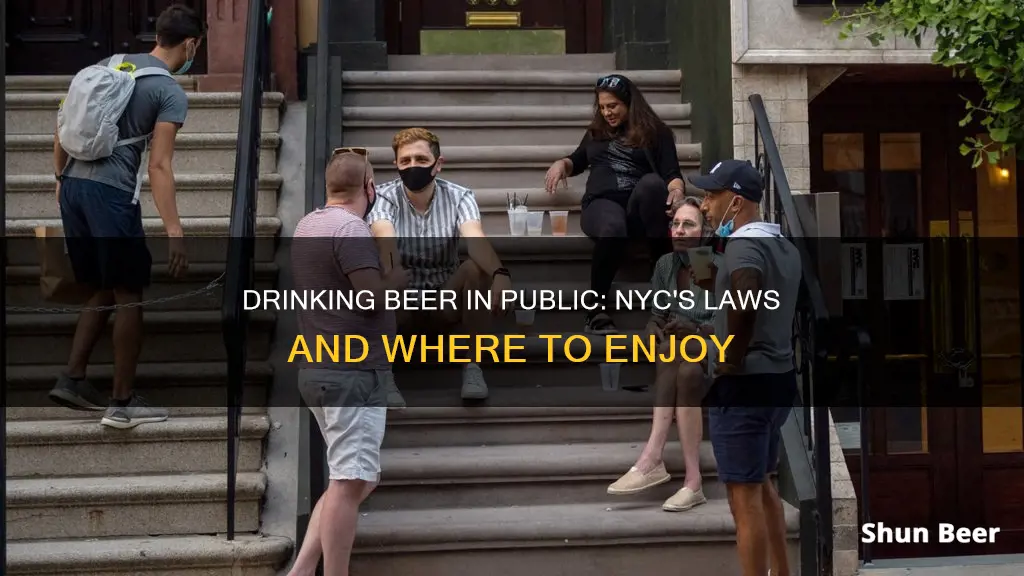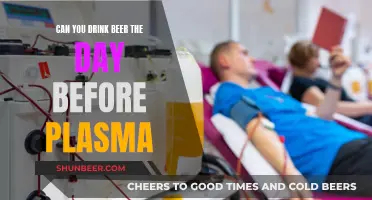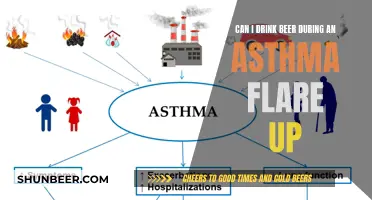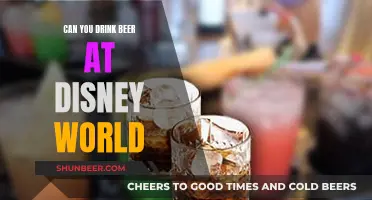
Drinking in public is prohibited in New York City, and doing so can result in fines or even arrest. However, there are exceptions to this rule, as some public events allow alcohol consumption with the proper permits, and certain designated areas within parks also permit drinking. The enforcement of these laws is inconsistent, and some people are policed more than others.
What You'll Learn

Drinking beer in public is illegal in NYC
Drinking beer in public is illegal in New York City. The state has strict laws governing public alcohol consumption, making it prohibited to drink in public places such as streets or parks. These laws apply to all types of alcoholic beverages, including beer. Violating these laws can result in fines or even arrest.
The open container law in NYC states that no person shall possess or consume an open container containing an alcoholic beverage in any public place, including streets, sidewalks, and parks. This means that drinking beer from an open can or bottle in public is illegal and can lead to legal consequences.
However, there are some exceptions to these rules. Alcohol consumption may be allowed at certain public events with proper permits, and during special events in designated areas within parks, such as SummerStage concerts in Central Park. It's important to note that these exceptions only apply within the specified areas, and drinking outside of these designated areas is still illegal.
Additionally, there are ways to discreetly consume alcohol in public without attracting attention from law enforcement. Some people pour their beer or wine into inconspicuous containers like thermoses or plastic bottles, making it less obvious that they are consuming alcohol. However, it's important to note that doing so does not make it legal, and there is still a risk of being fined or arrested if discovered by the authorities.
The enforcement of these laws can vary depending on the location and the behavior of those consuming alcohol. For example, a sedate picnic in a park is less likely to draw attention from the police than a group of rowdy individuals drinking in public.
In conclusion, while drinking beer in public is generally illegal in NYC, there are certain exceptions and ways to discreetly consume alcohol without attracting attention. However, it's important to be aware of the legal risks involved and to stay informed about the local regulations and guidelines regarding alcohol consumption in public spaces.
Beer in Baking: The Secret to Perfect Crusts and Doughs
You may want to see also

Open container laws apply citywide
Open container laws apply across New York City, meaning that walking around with an open alcoholic drink can get you in trouble. These laws are part of the New York State Alcoholic Beverage Control Law, which contains new privileges for on-premises licensees to serve liquor and wine "Drinks To-Go" for takeout and delivery.
The open container laws prohibit the consumption of alcoholic beverages in public places, including streets, roads, sidewalks, parking areas, shopping areas, amusement parks, playgrounds, and beaches. These laws are enforced by the police, who have the authority to issue summonses for consumption of alcohol in public places.
It's important to note that the definition of a "public place" does not include premises licensed for the sale and consumption of alcoholic beverages or private property. Additionally, alcoholic beverages purchased for takeout or delivery must be packaged in a container with a secure lid or cap that is sealed to prevent consumption without breaking the seal.
The open container laws also apply to vehicles located in public places. This means that drinking or possessing an open container of alcohol in a car parked on a public street or in a park is prohibited.
While the open container laws are consistently enforced, there are some exceptions. For example, during special events or block parties, alcohol consumption may be permitted within designated areas with proper permits. Additionally, there are certain designated areas within parks, such as outdoor cafes or restaurants with the appropriate licenses, where alcohol consumption is allowed.
It's worth noting that the enforcement of these laws may vary depending on the location and the behavior of individuals. In some cases, being discreet about alcohol consumption in public places may reduce the likelihood of being noticed or confronted by the authorities.
Beer and Tetanus Shots: What You Need to Know
You may want to see also

Drinking in parks is prohibited
Drinking in public places, including parks, is generally prohibited in New York City. This means that drinking alcohol in any NYC park, public place, street, or highway is illegal. These strict laws are enforced by the New York State government and aim to prevent public drunkenness.
Open Container Laws
Open container laws apply citywide in New York. This means that walking around with an open container of alcohol is illegal and can result in fines or even arrest. An open container is defined as any alcoholic beverage in a container that is not sealed with a secure lid or cap. These laws apply to all public places, including parks, and are subject to enforcement by law enforcement officers.
Exceptions to the Rule
While drinking in parks is generally prohibited, there are some exceptions to this rule. Alcohol consumption may be permitted during special events or public functions, such as free concerts in the park, with the proper permits. Additionally, there are designated areas within certain parks, such as Central Park, where alcohol can be consumed. These areas include outdoor cafes or restaurants with the appropriate liquor licenses.
Enforcement and Penalties
The enforcement of drinking laws in parks may vary depending on the location and the behavior of individuals. Undercover cops or police officers may be present at parks to monitor alcohol consumption. While drinking discreetly from a thermos or opaque container may reduce the likelihood of being noticed, it is still illegal and may result in penalties if discovered. The penalty for drinking in parks or other public places is typically a summons, which is a non-criminal offense.
Alternative Options
For those wishing to enjoy a drink outdoors, there are alternative options to consider. Drinking at outdoor cafes or restaurants with the proper licenses is permitted. Additionally, some parks, such as Bryant Park and Madison Square Park, may be more suitable for discreet drinking, as enforcement may vary depending on the park's size and location.
In conclusion, while drinking in parks is prohibited in New York City, there are exceptions during special events and in designated areas. It is important to familiarize yourself with local regulations and be mindful of the potential penalties for violating these laws.
Beer Mile Basics: Drink, Run, Repeat
You may want to see also

Drinking in public is a non-criminal offence
Public drinking laws in NYC include the regulation of open containers. These laws apply to any public place, including streets, roads, sidewalks, parking areas, shopping areas, playgrounds, parks, and beaches. The only exception is for events with the proper permits, such as block parties or feasts.
If you are caught drinking in public, a police officer can give you a summons without actually seeing you drink. They can presume that you intend to consume the alcoholic beverage if you are in possession of an open container. However, you have the right to defend yourself in court and try to defeat that presumption.
It's important to note that these laws are not always enforced, and there are circumstances under which drinking in public may be tolerated. For example, during free concerts in the park, many people bring wine with their picnics without any issues. As long as you are discreet and not causing any disturbances, you may not be bothered by law enforcement.
To avoid attracting attention, some people drink from opaque containers or use water bottles instead of obvious wine bottles or beer cans. However, keep in mind that drinking in public is still prohibited, and there is always a chance of being fined, even if it is rare.
Is Expired IPA Beer Drinkable?
You may want to see also

Drinking is allowed at certain events with proper permits
It is illegal to drink alcohol in public in New York City. However, drinking is allowed at certain events with the proper permits.
According to New York State law, drinking in public places, including streets and parks, is prohibited. Violating these laws can result in fines or even arrest. The open container law applies citywide, meaning that walking around with an open alcoholic drink is not allowed.
However, there are exceptions to this rule. Alcohol consumption is permitted at specific public events with the proper permits. For example, during SummerStage concerts in Central Park, alcohol consumption may be allowed within designated areas. It's important to check the event's guidelines beforehand to ensure you're following the rules.
Additionally, there are designated areas within Central Park where alcoholic beverages can be consumed, such as outdoor cafes or restaurants with the appropriate licenses.
It's worth noting that while drinking in public is illegal, enforcement may vary depending on the location and the discretion of law enforcement officers. Some people choose to drink discreetly from opaque containers or water bottles, but it's important to remember that drinking in public is still illegal, and there is a risk of being fined or arrested.
To legally consume alcohol in public spaces, it is necessary to obtain the proper permits or visit designated areas within parks that allow alcohol consumption, such as licensed outdoor cafes or restaurants.
Drinking Beer in Dubai: What's Allowed and What's Not
You may want to see also
Frequently asked questions
No, it is illegal to drink alcohol in public in New York City. This includes streets, parks, and vehicles in public places.
Violating these laws can result in fines or even arrest. However, it is considered a non-criminal offence.
Yes, public events with the proper permits may allow alcohol consumption. There are also designated areas within Central Park, such as outdoor cafes or restaurants with the appropriate licenses, where alcohol is permitted.







